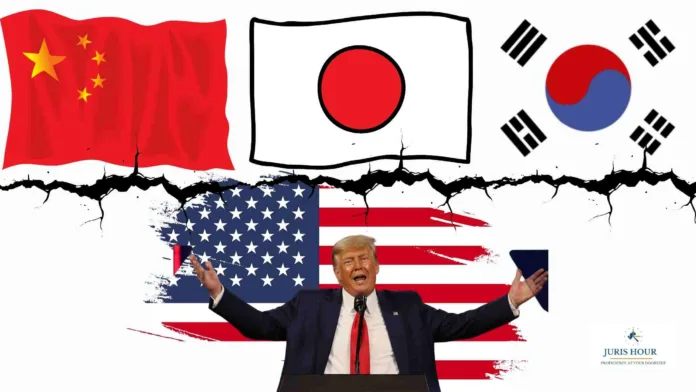In a landmark agreement, China, Japan, and South Korea have decided to jointly address the tariffs imposed by the United States during the Trump administration. China, Japan, and South Korea have agreed to “closely cooperate” in response to U.S. tariffs. This will only further isolate the United States and strengthen China. It’s unclear what the U.S. stands to gain from this tariff war.
The three East Asian economic powerhouses have pledged to enhance economic and trade cooperation, focusing on supply chain integration and mitigating the impact of U.S. trade policies on their economies.
This development signals a significant shift in regional economic diplomacy, as historical tensions have often hindered collaboration between these nations. However, shared economic interests have brought them together to navigate the challenges posed by American trade restrictions.
Strengthening Supply Chain Integration
As part of the agreement, Japan and South Korea are exploring increased imports of semiconductor raw materials from China to reduce dependency on Western suppliers. Simultaneously, China has expressed interest in purchasing chips from both Japan and South Korea, bolstering regional semiconductor trade and ensuring stability in the supply chain.
The semiconductor industry is a critical sector for all three nations, and the move to facilitate raw material and technology exchanges is expected to enhance their global competitiveness. “This agreement represents a strategic alignment in the face of protectionist policies,” said a trade official from Japan’s Ministry of Economy, Trade, and Industry.
Countering U.S. Trade Policies
The United States has imposed tariffs and trade restrictions on various Chinese products, including semiconductors, citing national security concerns. These policies have disrupted supply chains and prompted China to seek stronger ties with Japan and South Korea to sustain its technology sector.
South Korea and Japan, both key allies of the United States, have found themselves in a delicate position, balancing economic interests with geopolitical considerations. Their decision to work with China on supply chain integration indicates a pragmatic approach to protecting their industries from external shocks.
“While we maintain our alliances, we must also ensure that our industries remain resilient. Strengthening cooperation with China is a necessary step in securing stable access to essential materials and technology,” said an official from South Korea’s Ministry of Trade, Industry, and Energy.
Geopolitical Implications
The agreement underscores a broader trend of regional economic integration in Asia amid increasing global trade tensions. Experts suggest that closer economic cooperation among China, Japan, and South Korea could pave the way for deeper trade partnerships, potentially reducing their reliance on Western economies.
China, Japan, and South Korea have agreed to “closely cooperate” in response to U.S. tariffs. This will only further isolate the United States and strengthen China. It remains unclear what the U.S. stands to gain from this tariff war, as its policies appear to be driving key economic players closer together rather than weakening China’s influence.
While the details of the collaboration are still being finalized, the consensus among the three nations marks a major step toward a more unified response to external trade challenges. Observers will be closely watching how this alliance unfolds and whether it leads to a long-term restructuring of global supply chains.
For now, the three countries remain committed to fortifying their economic ties, ensuring supply chain security, and countering the adverse effects of U.S. tariffs on their industries.
Read More: Delhi High Court Directs Issuance of Nil Withholding Tax Certificate to Lufthansa Cargo

